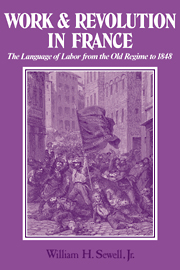Book contents
- Frontmatter
- Contents
- Preface
- 1 INTRODUCTION: SOCIAL HISTORY AND THE LANGUAGE OF LABOR
- 2 MECHANICAL ARTS AND THE CORPORATE IDIOM
- 3 JOURNEYMEN'S BROTHERHOODS
- 4 THE ABOLITION OF PRIVILEGE
- 5 FROM GENS DE MÉTIER TO SANS-CULOTTES
- 6 A REVOLUTION IN PROPERTY
- 7 INDUSTRIAL SOCIETY
- 8 WORKERS' CORPORATIONS
- 9 THE JULY REVOLUTION AND THE EMERGENCE OF CLASS CONSCIOUSNESS
- 10 THE PARADOXES OF LABOR
- 11 THE REVOLUTION OF 1848
- 12 CONCLUSION: THE DIALECTIC OF REVOLUTION
- Notes
- Bibliography
- Index
8 - WORKERS' CORPORATIONS
Published online by Cambridge University Press: 06 November 2009
- Frontmatter
- Contents
- Preface
- 1 INTRODUCTION: SOCIAL HISTORY AND THE LANGUAGE OF LABOR
- 2 MECHANICAL ARTS AND THE CORPORATE IDIOM
- 3 JOURNEYMEN'S BROTHERHOODS
- 4 THE ABOLITION OF PRIVILEGE
- 5 FROM GENS DE MÉTIER TO SANS-CULOTTES
- 6 A REVOLUTION IN PROPERTY
- 7 INDUSTRIAL SOCIETY
- 8 WORKERS' CORPORATIONS
- 9 THE JULY REVOLUTION AND THE EMERGENCE OF CLASS CONSCIOUSNESS
- 10 THE PARADOXES OF LABOR
- 11 THE REVOLUTION OF 1848
- 12 CONCLUSION: THE DIALECTIC OF REVOLUTION
- Notes
- Bibliography
- Index
Summary
WHEN WORKERS ADOPTED a corporate vocabulary and corporate forms of organization in the early nineteenth century, they were not attempting to restore the corporate system as it existed under the old regime. They were attracted to the corporate idiom because of its inherent opposition to competitive individualism, not because they wanted hierarchical corporations governed by masters. Under the old regime, corporations were legally sanctioned bodies, and their language and institutions recapitulated the hierarchical premises of the traditional monarchy. But after the Revolution, proprietary individualism became the dominant idiom of the state, and the corporate idiom became a language of opposition. Nineteenth-century workers' corporations were organized on the margins of the law and could not exist without the continued voluntary effort of their members. The great problem they faced was maintaining a solidary and ordered trade community against the powerful individualistic tendencies of contemporary society. The result was corporations that, in spite of the apparent continuities of language and form, were very different from those of the old regime, corporations that, given the dynamics of nineteenth-century society and politics, eventually developed into the cells of a revolutionary democratic and socialist movement in 1848.
The history of workers' organization in the first half of the nineteenth century is not well known, and the question of corporate themes in these organizations has not been addressed in the existing literature. A good deal of pertinent evidence can be culled from existing works, and such evidence has been used here extensively.
- Type
- Chapter
- Information
- Work and Revolution in FranceThe Language of Labor from the Old Regime to 1848, pp. 162 - 193Publisher: Cambridge University PressPrint publication year: 1980

